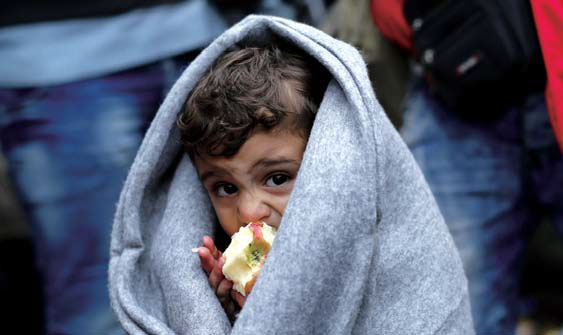US urged to lend hand with refugee crisis
China ready to step up assistance to countries grappling with influx of distressed migrants, says Xi
As migrants from war-torn Syria continue to flood into the European Union, two Belgian academics have urged the United States to do more to help solve the crisis.
"Although this refugee crisis has been going on for a long time, the US has done very little in terms of finding solutions for refugees," says Chinglin Pang of the Catholic University of Leuven in Belgium.
|
A migrant child eats an apple as he waits next to the Croatian border near the village of Berkasovo, Serbia. Antonio Bronic / Reuters |
In the past four years, more than 4 million Syrians have fled their country, where the US is supporting opponents of the government of President Bashar al-Assad. The US has agreed next year to take 85,000 refugees - many, though not all, from Syria. Others would come from strife-torn areas of Africa. In 2017, the number would be increased to 100,000.
China has vowed to provide more assistance to refugees. President Xi Jinping told Croatian President Kolinda Grabar-Kitarovic at the Great Hall of the People in Beijing on Oct 14 that China has paid close attention to the refugee issue in Europe and the Mediterranean and sympathizes with the refugees.
"The Chinese government will further provide assistance to refugees in relevant countries to help ease the humanitarian crisis," Xi said, according to a news release issued after his meeting with Grabar-Kitarovic.
Frontex, the border management agency of the European Union, says more than 710,000 migrants crossed into the EU in the first nine months of this year, with the Greek islands of the Aegean Sea continuing to be the most affected area. For the whole of last year 282,000 migrants entered the EU, Frontex says.
The number of irregular crossings detected at EU borders with non-EU countries stood at 170,000 last month compared with 190,000 recorded in August.
The Greek islands, especially Lesbos, have continued to face huge migratory pressures, with 350,000 irregular entries having been recorded in the first nine months of the year.
Pang says: "In general, these displaced people have been deprived of any resources and any respect, and there is a consensus in the EU that we should provide shelter and protection for them."
However, there is no consensus on whether the migrants should be allowed to remain permanently in the places where they have taken refuge, she says.
Talking of budgetary measures relating to the crisis, Pang says money is needed to accommodate the displaced people but also to better control borders.
Johan Leman, another professor at the Catholic University of Leuven, says the migrant crisis has several causes.
"Of course, because of war the outlook for them and their children is bleak, so they have fled."
US intervention in countries to bring about change has always been highly problematic, Lehman says.
The approach the US takes to governments it considers to be on the way to "liberal US democracy" and those it considers dictatorships lacks finesse, he says, and the US remains "too Western in its approach to democracy in the world".
The EU's member states are being asked to share the burden of migrants, Leman says, but there is no policy to stem the flow of these people from their countries. He sees only two solutions.
One would be to create a UN-protected humanitarian area in the countries of provenance and the other would be to improve the quality of life of refugees who have fled to neighboring countries, something that would involve spending money.
The EU should also understand that it needs an agreement in this question with countries such as Russia, Iran, Saudi Arabia and China, says Leman. "As long as these problems are not solved, the EU will have to find more and more money in the future."
Countries neighboring the EU that have been bearing the brunt of the crisis include Jordan, Lebanon, Turkey and Iraq. The vast majoirty of refugees have flowed into these countries.
European leaders were to hold two days of talks on the crisis beginning on Oct 15.
fujing@chinadaily.com.cn



















